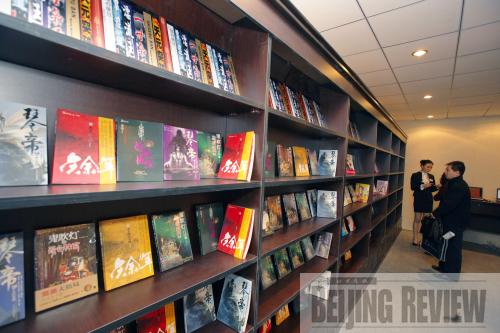|
 |
|
ONLINE OPTION: The growing popularity of Internet literature means huge opportunities for writers to become famous and wealthy |
During the day, Ren Yuan, in his 30s, works as a software developer. But at night he is a novelist who updates his serial Internet story, which will be consumed by tens of thousands of registered online readers.
Zhang Wei, in his 20s, is more of a full-time writer--he works six to eight hours every day, building onto his online novels at an average rate of 9,000 words a day. Ren can usually put down 3,000 to 4,000 words a day on average. Both men are contract writers with qidian.com, which claims to be the biggest online reading website in China and boasts over 2 million paying customers a day.
 |
|
OFFLINE BOOKS: A visitor looks through books published from online-novel writers by Shanda Literature at the Sixth China International Internet Culture Expo on October 23, 2008, in Beijing (CFP) |
There are some 150,000 people who write just like Ren and Zhang on the Internet for qidian.com. These amateur writers from all walks of life knit and weave stories day after day to feed the appetites of numerous online readers.
"I usually read seven or eight novels online at the same time. It's very convenient. I don't have to go to bookshops, but need only search online to find the works I like," says Liu Liang, a 26-year-old Shanghai resident and qidian.com enthusiast.
Online reading business
Reading online novels is one of the major things that Chinese netizens like to do when they surf the Net, according to a survey by iResearch, an online research company. In China, there are now more than 10,000 websites like qidian.com that provide original reading services.
"Online reading is very interactive," said Liu. "Readers like me often exchange ideas on works we are reading, and sometimes the authors invite us to vote on the development of their plots."
Liu pays an average of 50 yuan ($7.20) per month to read online. He said with this amount of money he can read many times more online books than printed ones.
"Pay-online reading has become a part of my life. It does not cost very much, but it is a kind of respect for the authors," Liu said.
Reading service providers like qidian.com have developed a business model to survive and flourish. Customers pay 0.02 yuan per thousand words to read anything on the site.
Shanda Literature, which runs three popular online-novel websites including qidian.com, controls over 90 percent of China's online-reading market. "About 62 percent of the registered readers of the three websites spend an average of 60 minutes online reading novels daily. VIP users recharge 50 yuan at a time and that money can be spent in about a month," said Hou Xiaoqiang, founding CEO of the company.
Authors with the websites get paid in two ways. They get 30 percent of subscription fees while the website keeps 70 percent. Authors also receive remuneration. Contract writers are paid 20-1,000 yuan ($2.80-$144.90) per thousand words to sell rights to the whole work directly to the website. In this way they receive a fixed income regardless of the number of customers that read their work.
| 